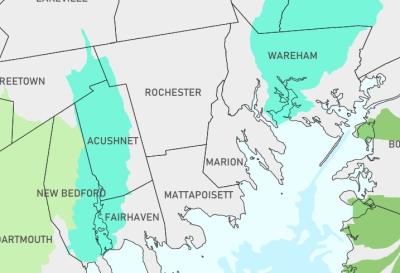Tri-Town officials wary of possible septic regulation changes
Health officials across the Tri-Town are wary of costly changes proposed by the Massachusetts Department of Environmental Protection that could affect septic systems in Marion, Mattapoisett and Rochester.
In an effort to decrease the amount of nitrogen entering the region’s waterways, the state proposes towns either apply for “watershed permits” or have septic system owners upgrade their tanks to ones using “best available nitrogen technology” — which is estimated to cost upward of $15,000 per installation.
The changes are currently in draft form.
Nitrogen, which promotes plant growth, is a key ingredient in fertilizer and is plentiful in septic waste. When nitrogen oversaturates waterways, like Buzzards Bay, it promotes algae growth that blocks sunlight from getting to plants and creatures below the water through a process called eutrophication.
Only communities that are in specified “nitrogen sensitive areas” need to abide by these regulations. Neither Marion, Mattapoisett nor Rochester have yet been given this designation, but Rochester Board of Health Chair Karen Walega said she is “quite certain” it will happen soon due to the aquifers that run under the Tri-Town.
“For the average homeowner who is struggling with inflation or for the poor, average senior citizen who is just about making it, this is a horrendous cost that will be imposed on them,” she said.
According to Walega, Rochester has not yet been designated as a “nitrogen sensitive area,” by MassDEP and she does not know how many of Rochester’s 2,900 homes would be affected.
In Marion, officials are similarly concerned about the costs associated with installing active nitrogen removal systems.
Marion Board of Health Chair John Howard explained that while the initial cost of the system is already high. Maintenance fees, inspections and utility fees would further increase the burden on homeowners, he said.
“We all sit around and talk about affordable houses and affordable places for our children to live. And when you go sit down at the bank and the septic system costs $8,500 or $10,000, that child is not going to get a mortgage, quite frankly,” said Marion Select Board Chair Randy Parker.
To help alleviate some of that financial burden, the state will allow impacted residents to apply for low-interest loans from their local boards of health for these new systems.
”The only way we protect our coastal waters is through improved wastewater treatment, and we need to make those improvements as affordable as possible,” said Korrin Peterson, the Buzzards Bay Coalition’s vice president of clean water advocacy.
Meanwhile, officials in Mattapoisett are planning to apply for a watershed permit, a 20-year permit which would allow the town to pursue alternative methods to lower nitrogen levels, said Mattapoisett Town Administrator Mike Lorenco.
These methods could include regulating fertilizer use in the town and implementing pilot-scale denitrifying barriers, a process which is essentially “shooting vegetable oil into the ground which helps nitrogen into getting into the water source,” said Lorenco.
“If [the DEP accepts] that permit, then we would have to show within five years that there has been some improvement [in nitrogen levels],'' said Mattapoisett Board of Health member Carmello Nicholosi.
“Quite frankly this is another half-baked unfunded mandate coming from the Commonwealth,” said Select Board member Jordan Collyer.
Regardless of how each individual town plans to approach the changes proposed by the DEP, officials have stressed the importance of providing public comment to the department.
“Get your comment in there,” said Marion Interim Town Administrator Judy Mooney. “Start screaming.”
MassDEP has held three public hearings on Nov. 30, Dec. 1, and Dec. 5. Two more are scheduled for Jan. 24 and Jan. 25 at 6 p.m.
The DEP is accepting written comments until 5 p.m. on Jan. 30. Comments can be submitted by email to dep.talks@mass.gov and must include “Title 5 and Watershed Permit” in the subject line.
All comments submitted must include the name and contact information of the resident.















